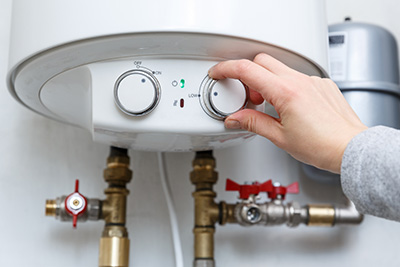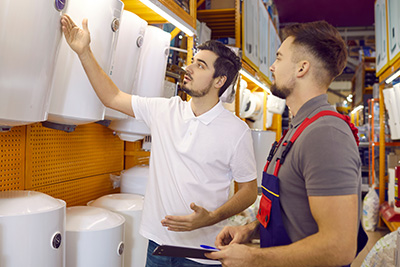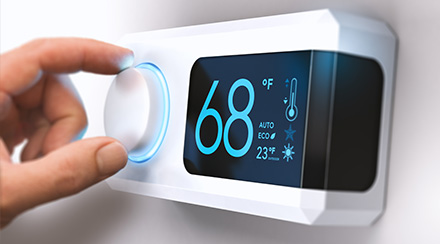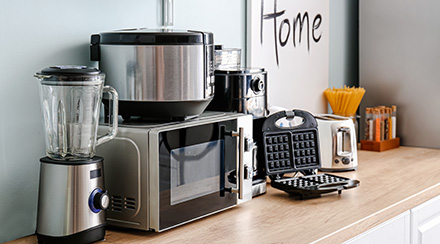Water Heater Energy Efficiency Explained

Unless you like taking cold showers, water heating is probably not something you can live without. But did you know that your water heater is one of the biggest energy consuming appliances in your home?
According to the U.S. Energy Information Administration, water heating accounts for 19% of the energy use in the average U.S. home. But this can vary quite a bit depending on what type of water heater you have, what kind of shape it’s in and how much hot water you use.
Let’s take a closer look at the different types of water heaters and best practices for saving energy on hot water.
How Does a Water Heater Work?
There are several types of water heaters, and they work differently in terms of energy sources and heating mechanisms.
How Do Gas and Electric Tank Water Heaters Work?
The most common type of water heater in the U.S. is a tank water heater, in which water is stored in a large tank and maintained at a high temperature on standby. These typically use either electricity or natural gas to power a heating element inside the tank, though some models can be powered with propane or heating oil.
Hot water is drawn directly from the tank, which automatically refills itself as needed. This means that the water temperature may gradually decrease during periods of heavy use, and that you may temporarily run out of hot water altogether.
How Does a Tankless Water Heater Work?
Tankless water heaters take up much less space than conventional tank water heaters, and they heat water instantaneously when you turn on a hot water tap. That means you don’t have to wait as long for the water to heat up, you won’t spend energy maintaining the temperature of stored water and you won’t run out of hot water during periods of heavy use.
Tankless water heaters cost more to purchase and install, but they’re more energy efficient overall than conventional models, and can pay for themselves in time with energy savings.
Are There Other Types of Water Heaters?
Though less common, there are a few other types of residential water heaters. Solar water heaters use storage tanks, similarly to conventional water heaters, but they’re typically installed on rooftops and use integrated solar panels to help power the heating elements. Heat pump water heaters work by moving heat from one place to another, much like refrigerators do, but they’re only practical for use in certain temperate climates. There are also indirect water heaters that use heat from a home’s space heating system to keep water warm.
Not every home will be a good candidate for one of these systems, but they all offer energy efficiency advantages over conventional tank water heaters.
Shopping for a New Water Heater

A conventional tank water heater should last eight to 12 years, and tankless water heaters tend to last between 15 and 20 years. Even if water heaters remain usable beyond these typical lifespans, they lose efficiency as they age, and they could start costing you more money than you’d save by delaying replacement.
When it comes time to replace your water heater, be sure to look into all the available heater and fuel types to see what’s feasible for your home and budget. There may be some options that have a higher upfront cost, but will be cheaper over the long haul.
Be sure to look for two things when comparing water heaters: the EnergyGuide label and the ENERGY STAR logo. The EnergyGuide label is a black and yellow label that is required by law and that displays standardized energy consumption information. You can use this information to compare efficiency ratings, overall energy consumption and estimated annual operating costs. The ENERGY STAR logo will not appear on every water heater, but when you see it, you’ll know at a glance that it’s a model that meets the highest energy efficiency standards.
Water Heater Temperature Setting
The temperature setting you choose for your water heater’s thermostat will have a direct effect on energy consumption, especially when it comes to conventional tank water heaters. Your ideal setting will depend on your preferences, home appliances and safety concerns, but should fall somewhere between 120 and 140 degrees Fahrenheit.
120 degrees is warm enough for a hot shower and sufficient to kill off most harmful bacteria, so if you find this setting comfortable, you can use it to save energy year-round. You might want to set the temperature higher, however, if there are immunocompromised people in your home and you want to completely eliminate the small risk of bacteria development. You may also want a higher temperature if you use a dishwasher that cannot heat water internally.
If you set the thermostat closer to 140 degrees for these reasons, keep in mind that such a temperature presents a scalding risk, especially if you have small children in the home. As a workaround, you can have anti-scald valves installed on specific faucets and showerheads to eliminate this risk without lowering the water heater temperature.
Hot Water Heater Maintenance
It’s a good idea to have your water heater inspected and serviced annually by a licensed professional. Tankless and heat pump water heaters require relatively little maintenance, but tank water heaters need a bit more attention. Annual maintenance will typically include the following:
- Flush the tank to remove sediment
- Inspect the heating element and replace if necessary
- Inspect the anode rod, which prevents corrosion, and replace if necessary
- Check and lubricate the TPR valve, which prevents dangerous pressure levels
- Inspect the thermostat, pilot light and other components
More Water Heater Energy Efficiency Tips
If you shop smart and schedule your annual maintenance, you’re off to a great start in keeping your water heating bills as low as possible. But there’s still more you can do; here are our best water heater energy efficiency tips:
- Wrap your tank water heater in an insulating jacket of the appropriate size. This will help maintain water temperature so your heating element doesn’t have to work as hard.
- Insulate your hot water pipes. This is a simple job in areas where hot water lines are accessible, like in the basement and underneath sinks. The longer your water lines are, the more this will help.
- Upgrade to low-flow showerheads and aerated faucets. These restrict water flow, which will help you conserve both water and water heating energy.
- Wash clothes with cold water whenever appropriate.
- Favor showers over baths, and try to keep your showers as short as possible.
Looking for Something Specific?
Select a category to find resources for topics that interest you.
Select Category

Related Articles:

Tips for Improving Your AC and Furnace Efficiency
We share maintenance tips for your heater and AC, and home improvement tips to help you use those systems less.
Read Article
Tips for Saving on Energy in Your Home
If you’re looking to learn more about energy efficiency for home systems and appliances, we’re sharing our favorite energy-saving tips.
Read Article
What Uses the Most Electricity In a Home?
We break down what uses the most energy in your home to give you an understanding of where your energy usage goes and where energy-saving tactics can make the most impact.
Read ArticleWater Heater Energy Efficiency Explained
Unless you like taking cold showers, water heating is probably not something you can live without. But did you know that your water heater is one of the biggest energy consuming appliances in your home?
According to the U.S. Energy Information Administration, water heating accounts for 19% of the energy use in the average U.S. home. But this can vary quite a bit depending on what type of water heater you have, what kind of shape it’s in and how much hot water you use.
Let’s take a closer look at the different types of water heaters and best practices for saving energy on hot water.
How Does a Water Heater Work?
There are several types of water heaters, and they work differently in terms of energy sources and heating mechanisms.
How Do Gas and Electric Tank Water Heaters Work?
The most common type of water heater in the U.S. is a tank water heater, in which water is stored in a large tank and maintained at a high temperature on standby. These typically use either electricity or natural gas to power a heating element inside the tank, though some models can be powered with propane or heating oil.
Hot water is drawn directly from the tank, which automatically refills itself as needed. This means that the water temperature may gradually decrease during periods of heavy use, and that you may temporarily run out of hot water altogether.
How Does a Tankless Water Heater Work?
Tankless water heaters take up much less space than conventional tank water heaters, and they heat water instantaneously when you turn on a hot water tap. That means you don’t have to wait as long for the water to heat up, you won’t spend energy maintaining the temperature of stored water and you won’t run out of hot water during periods of heavy use.
Tankless water heaters cost more to purchase and install, but they’re more energy efficient overall than conventional models, and can pay for themselves in time with energy savings.
Are There Other Types of Water Heaters?
Though less common, there are a few other types of residential water heaters. Solar water heaters use storage tanks, similarly to conventional water heaters, but they’re typically installed on rooftops and use integrated solar panels to help power the heating elements. Heat pump water heaters work by moving heat from one place to another, much like refrigerators do, but they’re only practical for use in certain temperate climates. There are also indirect water heaters that use heat from a home’s space heating system to keep water warm.
Not every home will be a good candidate for one of these systems, but they all offer energy efficiency advantages over conventional tank water heaters.
Shopping for a New Water Heater
A conventional tank water heater should last eight to 12 years, and tankless water heaters tend to last between 15 and 20 years. Even if water heaters remain usable beyond these typical lifespans, they lose efficiency as they age, and they could start costing you more money than you’d save by delaying replacement.
When it comes time to replace your water heater, be sure to look into all the available heater and fuel types to see what’s feasible for your home and budget. There may be some options that have a higher upfront cost, but will be cheaper over the long haul.
Be sure to look for two things when comparing water heaters: the EnergyGuide label and the ENERGY STAR logo. The EnergyGuide label is a black and yellow label that is required by law and that displays standardized energy consumption information. You can use this information to compare efficiency ratings, overall energy consumption and estimated annual operating costs. The ENERGY STAR logo will not appear on every water heater, but when you see it, you’ll know at a glance that it’s a model that meets the highest energy efficiency standards.
Water Heater Temperature Setting
The temperature setting you choose for your water heater’s thermostat will have a direct effect on energy consumption, especially when it comes to conventional tank water heaters. Your ideal setting will depend on your preferences, home appliances and safety concerns, but should fall somewhere between 120 and 140 degrees Fahrenheit.
120 degrees is warm enough for a hot shower and sufficient to kill off most harmful bacteria, so if you find this setting comfortable, you can use it to save energy year-round. You might want to set the temperature higher, however, if there are immunocompromised people in your home and you want to completely eliminate the small risk of bacteria development. You may also want a higher temperature if you use a dishwasher that cannot heat water internally.
If you set the thermostat closer to 140 degrees for these reasons, keep in mind that such a temperature presents a scalding risk, especially if you have small children in the home. As a workaround, you can have anti-scald valves installed on specific faucets and showerheads to eliminate this risk without lowering the water heater temperature.
Hot Water Heater Maintenance
It’s a good idea to have your water heater inspected and serviced annually by a licensed professional. Tankless and heat pump water heaters require relatively little maintenance, but tank water heaters need a bit more attention. Annual maintenance will typically include the following:
- Flush the tank to remove sediment
- Inspect the heating element and replace if necessary
- Inspect the anode rod, which prevents corrosion, and replace if necessary
- Check and lubricate the TPR valve, which prevents dangerous pressure levels
- Inspect the thermostat, pilot light and other components
More Water Heater Energy Efficiency Tips
If you shop smart and schedule your annual maintenance, you’re off to a great start in keeping your water heating bills as low as possible. But there’s still more you can do; here are our best water heater energy efficiency tips:
- Wrap your tank water heater in an insulating jacket of the appropriate size. This will help maintain water temperature so your heating element doesn’t have to work as hard.
- Insulate your hot water pipes. This is a simple job in areas where hot water lines are accessible, like in the basement and underneath sinks. The longer your water lines are, the more this will help.
- Upgrade to low-flow showerheads and aerated faucets. These restrict water flow, which will help you conserve both water and water heating energy.
- Wash clothes with cold water whenever appropriate.
- Favor showers over baths, and try to keep your showers as short as possible.
Looking for Something Specific?
Select a category to find resources for topics that interest you.
Select Category

Related Articles:

Tips for Improving Your AC and Furnace Efficiency
We share maintenance tips for your heater and AC, and home improvement tips to help you use those systems less.
Read Article
Tips for Saving on Energy in Your Home
If you’re looking to learn more about energy efficiency for home systems and appliances, we’re sharing our favorite energy-saving tips.
Read Article
What Uses the Most Electricity In a Home?
We break down what uses the most energy in your home to give you an understanding of where your energy usage goes and where energy-saving tactics can make the most impact.
Read Article






